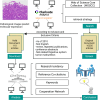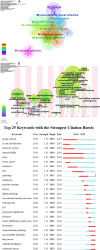Deep learning application in prediction of cancer molecular alterations based on pathological images: a bibliographic analysis via CiteSpace
- PMID: 39422817
- PMCID: PMC11489169
- DOI: 10.1007/s00432-024-05992-z
Deep learning application in prediction of cancer molecular alterations based on pathological images: a bibliographic analysis via CiteSpace
Abstract
Background: The advancements in artificial intelligence (AI) technology for image recognition were propelling molecular pathology research into a new era.
Objective: To summarize the hot spots and research trends in the field of molecular pathology image recognition.
Methods: Relevant articles from January 1st, 2010, to August 25th, 2023, were retrieved from the Web of Science Core Collection. Subsequently, CiteSpace was employed for bibliometric and visual analysis, generating diverse network diagrams illustrating keywords, highly cited references, hot topics, and research trends.
Results: A total of 110 relevant articles were extracted from a pool of 10,205 articles. The overall publication count exhibited a rising trend each year. The leading contributors in terms of institutions, countries, and authors were Maastricht University (11 articles), the United States (38 articles), and Kather Jacob Nicholas (9 articles), respectively. Half of the top ten research institutions, based on publication volume, were affiliated with Germany. The most frequently cited article was authored by Nicolas Coudray et al. accumulating 703 citations. The keyword "Deep learning" had the highest frequency in 2019. Notably, the highlighted keywords from 2022 to 2023 included "microsatellite instability", and there were 21 articles focusing on utilizing algorithms to recognize microsatellite instability (MSI) in colorectal cancer (CRC) pathological images.
Conclusion: The use of DL is expected to provide a new strategy to effectively solve the current problem of time-consuming and expensive molecular pathology detection. Therefore, further research is needed to address issues, such as data quality and standardization, model interpretability, and resource and infrastructure requirements.
Keywords: Bibliometrics; Cancer; CiteSpace; Molecular pathology; Visualization analysis.
© 2024. The Author(s).
Conflict of interest statement
The authors declare no competing interests.
Figures




References
MeSH terms
Grants and funding
LinkOut - more resources
Full Text Sources
Medical

